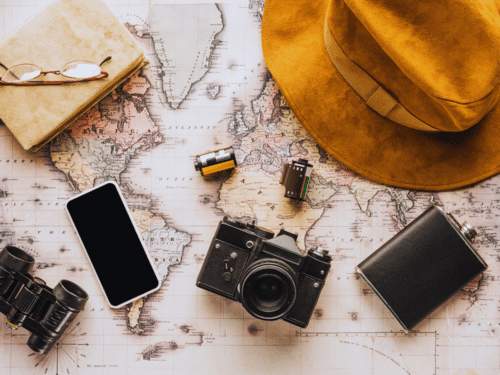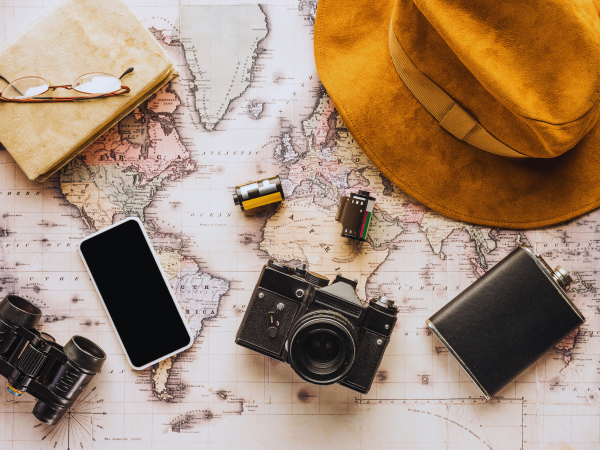
In the age of social media and instant connectivity, every travel choice seems to be under the microscope. What was once a personal decision—where to go, how often to travel, or how we impact the environment—has now become fodder for online judgment. With just a scroll, we can be bombarded with opinions and critiques, leading to a growing culture of travel shaming. The spotlight is no longer just on destinations but on how we share and experience our travels, forcing many to not underestimate the fine line between exploration and online scrutiny.
We are living in an age when even a casual conversation seems to trigger Google searches, as online algorithms track our discussions, preferences, and behaviors, shaping the content and ads we encounter. This digital omnipresence also influences our judgments, awareness, and perceptions, shaping not only how we view the world but also how we are viewed by others. It creates an environment where personal choices, including travel preferences, are constantly evaluated and shared, often leading to pressures to conform to certain ideals or expectations.
Also, the readily available information can be used to determine as many benefits and drawbacks as possible. Our attention is being diverted from genuine events to carefully managed "reel" moments by social media, according to a study from the American Psychological Association.

Additionally, the rise of social media has made travel more of a reel content rather than just a personal experience. Though they encourage wanderlust, social media sites like Instagram, TikTok, and X (previously called Twitter) have also brought attention to a problematic aspect of travel: careless conduct.
However, in many instances, because of social media, many were called out online for their reckless actions. In other words, social media did play a pivotal role in holding tourists accountable, and raised awareness in the process.
The rise of this phenomenonAs reports of environmental harm, cultural insensitivity, and rule-breaking have gone viral, calling out careless tourists has become more popular. In contrast to traditional travel advisories, which are issued by official agencies, social media users now act as watchdogs, highlighting instances of wrongdoing and igniting heated debates.

The key factors
Environmental destruction: Tourists who litter, deface landmarks, or damage natural habitats are often exposed online. For example, travellers caught carving their initials into historic sites, such as Rome’s Colosseum, have faced backlash, sometimes leading to legal consequences.
Cultural disrespect: Ignoring local customs, dressing inappropriately at religious sites, or engaging in offensive behavior often attracts criticism. One such instance featured influencers taking derogatory pictures near places of worship, which sparked outrage from both local communities and social media users.
Exploiting wildlife: There have been many recorded instances where people have gone far with their careless activities, by trying to feed them, chasing them for photos, or disturbing their natural habitat.

These kinds of behaviours mostly didn’t make for cute reels, but resulted in negative social media reactions. Despite warnings against animal abuse, footage of tourists riding elephants or upsetting wild animals in places like Yellowstone National Park have drawn worldwide censure.
Disturbance and overtourism: The rise of influencers promoting hidden gems has led to an increase in tourists, which has harmed the ecosystem and irritated locals. Social media users commonly criticise others for breaking the rules, such as hiking in protected areas or flying drones in areas where flying is prohibited.
How social media fuels accountabilitySocial media platforms play a crucial role in bringing attention to irresponsible travel behavior. Here’s how:
Instant documentation: Bystanders can swiftly record and disseminate instances of wrongdoing with cellphones in hand, making sure that such acts are not overlooked.
Hashtags and trends: Hashtags like #TravelShame, #TouristFail, and #RespectNature amplifies awareness and contributes to broader discussions on responsible tourism.
 Public outrage and repercussions
Public outrage and repercussions: Offenders who upload offensive content may face fines, travel bans, or even legal action.
Influencers receiving backlash: Audiences often call out well-known influencers who lead by example, for example by ignoring safety regulations or endorsing environmentally damaging practices.
Examples of travel shame
Etiquette in flight: Careless conduct isn't limited to ground only, as one such incident happened in air. It so happened that despite repeated instructions from cabin personnel to return to their seats, some passengers on a recent AirAsia aircraft from India to Thailand were seen standing and eating in midair. A fellow traveler named Ankit Kumar recorded the incident, which swiftly gained widespread attention. The footage showed individuals standing in the aisles, eating, and chatting, interfering with the flight and disregarding fundamental in-flight protocol.
A selfie gone too far: A more personal issue involving tourist behavior was brought to light by Dutch travel influencer "Avocado on the Road" during a train journey from New Delhi to Agra. The influencer found herself in a really awkward situation when travelling when a young Indian man kept taking selfies with her without her permission. The man persisted in his behaviour in spite of her courteous demands for him to cease, so she created a video and distributed it to her millions of followers.
The sad event that happened in Pattaya Beach: In the past few weeks, Pattaya Beach in Thailand has been embroiled in an awkward controversy when a group of Indian visitors were caught on camera peeing in the open. Many social media users quickly denounced the acts as the video went viral, bringing attention to a larger problem: how the actions of a small number of people can negatively represent a whole nation.
Venice's tough crackdown: Due to the city's overtourism problems, authorities have begun fining visitors who sit on historic sites or swim in waterways. Stronger enforcement has resulted from the exposure of violators by social media.
 Machu Picchu’s no-go zones
Machu Picchu’s no-go zones: Some tourists have been caught on camera trespassing into restricted areas of Machu Picchu for the perfect Instagram shot. Online outrage has led authorities to tighten regulations.
Japan’s tourist etiquette campaign: Due to repeated instances of tourists misbehaving, Japan has used social media to educate travelers on proper etiquette, including respecting temple rules and avoiding loud behavior in public transport.
The double-edged sword of travel shameWhile travel shame promotes accountability, it also raises ethical concerns:
Cyberbullying and public shaming: While some callouts are justified, others lead to excessive harassment, affecting individuals beyond just criticism of their actions.
Absence of context: Posts that go viral might not necessarily tell the whole situation, which could cause misconceptions or unjust charges.
Performative activism: Some users engage in travel shaming simply for likes and shares, rather than genuine concern for responsible tourism. And most social media users think they have the right to comment or have the authority to demean anyone they like.
Encouraging responsible tourism

Rather than just shaming bad behavior, social media can also be a tool for positive change. Here’s how:
- Encouraging visitors and influencers to exhibit responsible tourism practices can inspire others to do the same, which in turn promotes ethical travel content.
- Educating rather than shaming: Posts that provide information on the negative effects of particular behaviours may be more successful than those that criticise specific people.
- Supporting sustainable tourism initiatives: Promoting environmentally sustainable travel choices, ethical tour companies, and conservation initiatives can help tourists develop a respectful and conscious mindset.
Travel shame, fueled by social media, has become a powerful force in highlighting and discouraging irresponsible tourism. While it has its downsides, such as the potential for online harassment, it also plays a crucial role in holding travelers accountable. By using social media responsibly—not just for shaming but for education and advocacy—travellers can actually help create a more ethical and sustainable global tourism industry
 In the age of social media and instant connectivity, every travel choice seems to be under the microscope. What was once a personal decision—where to go, how often to travel, or how we impact the environment—has now become fodder for online judgment. With just a scroll, we can be bombarded with opinions and critiques, leading to a growing culture of travel shaming. The spotlight is no longer just on destinations but on how we share and experience our travels, forcing many to not underestimate the fine line between exploration and online scrutiny.
In the age of social media and instant connectivity, every travel choice seems to be under the microscope. What was once a personal decision—where to go, how often to travel, or how we impact the environment—has now become fodder for online judgment. With just a scroll, we can be bombarded with opinions and critiques, leading to a growing culture of travel shaming. The spotlight is no longer just on destinations but on how we share and experience our travels, forcing many to not underestimate the fine line between exploration and online scrutiny.





